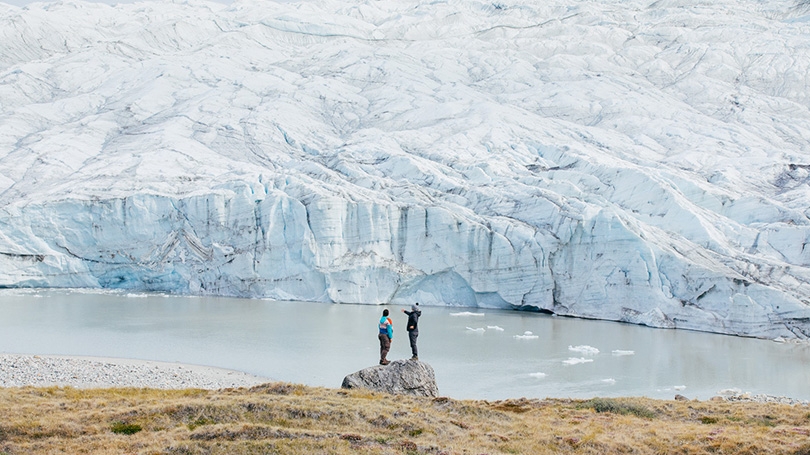Dartmouth's Arthur L. Irving Institute for Energy and Society and Thayer School of Engineering will collaborate with the U.S. Army Corps of Engineers' Cold Regions Research and Engineering Laboratory (CRREL) to assess ways to improve energy services, delivery, storage, and mobility for military bases in the Arctic.
The project's principal investigator is Professor of Environmental Studies Elizabeth Wilson, director of the Irving Institute. Co-investigators are associate professors of engineering Amro Farid and Jifeng Liu, and Weiyang Li, the William P. Harris Career Development Assistant Professor of Engineering.
"CRREL is ramping up in the energy engineering space, and Dartmouth is ramping up in the energy space. So this is a natural relationship that we really hope to foster and grow over the next couple of decades," says Wilson. "This collaboration builds on Dartmouth's historic strength in the Arctic as we work to develop our focus on the area of cold regions energy systems. This broad collaboration will make Dartmouth stronger."
The Army needs to perform and extend its mission in the Arctic as that region gains international attention for its resources and strategic position, according to the CRREL project description. Energy delivery is central to cold weather operations and must be tackled at the system and technology levels, CRREL writes.
Wilson says this expansion of the College's long-standing research relationship with CRREL "highlights how the Irving Institute can really draw on Dartmouth's strengths to address energy and societal considerations in critical new contexts."
Thayer Dean Alexis Abramson, who is a professor of engineering, says the faculty researchers involved in the project are working at the cutting edge of energy research to solve the technical challenges of creating robust power delivery systems to operate in extremely cold conditions.
"This is an incredible opportunity for Dartmouth engineers to catalyze energy solutions for the Arctic with far-reaching applications beyond the military," says Abramson. "The solutions we develop in collaboration with CRREL and the Irving Institute have the potential to provide communities in these cold regions, where we are seeing the most alarming impacts of climate change, with energy storage solutions and efficient power delivery systems that help them contend with and curb the effects of global warming."
U.S. Sen. Jeanne Shaheen (D-N.H.), as a senior member of the Senate Appropriations and Armed Services Committees, helped facilitate funding of the work.
"I'm very pleased to see the Irving Institute at Dartmouth be selected for such an important research opportunity, continuing New Hampshire's legacy as a leader in scientific innovation and discovery," said Shaheen. "As our climate continues to change and more areas such as the Arctic become accessible, it's critical that we have the information necessary to adapt and respond, especially when it comes to safeguarding our military installations and ensuring they can meet their energy needs."
The project's objective is to extend the Army's mission capabilities by up to 30 percent while testing new technologies that will lead to the next generation of energy-delivery and storage systems for extremely cold regions.
The overall project comprises three sub-projects, which will be executed simultaneously and led by Thayer faculty:
- The Arctic Resilient Intelligent Integrated Energy System project will develop a multi-modal energy management system that optimizes the supply, demand, and storage of energy for an Arctic military base's operation. The project will be led by the Laboratory for Intelligent Integrated Networks of Engineering Systems at Thayer, which maintains an expertise in the enhancement of sustainability and resilience in intelligent energy systems. Associate Professor Amro Farid will be responsible for project management.
- Energy Storage Solutions for Extremely Cold Environments: Development of Novel High-Energy Lithium Batteries: This project addresses the challenges posed by the extreme cold to the electrochemical reactions of batteries, making it difficult for the batteries to deliver the stored energy. The faculty members making up the team are Assistant Professor of Engineering Weiwang Li, Assistant Professor of Chemistry Katherine Mirica, and Professor of Engineering Ian Baker. The project will integrate Li's expertise in designing new, efficient, and cost-effective electrochemical energy storage devices; Mirica's expertise in synthesizing porous conductive framework materials for targeted applications; and Baker's expertise in cold stage electron microscopy characterization.
- The Porous Thermoelectric Cells for Waste Heat Recovery in Arctic Stations and Habitats project will develop lightweight porous thermoelectric materials and thermoelectric cells to recover the waste heat from power generators in the Arctic region, converting the wasted thermal energy directly to electricity. The project integrates Liu and Baker's work on thermoelectric materials, Associate Professor of Engineering Ulrike Wegst's expertise in porous materials and freeze-casting, and the work of Associate Professor of Engineering Jason Stauth and Professor of Engineering Charles Sullivan on power electronics design for integrating the porous thermoelectric cells.
William Platt can be reached at william.c.platt@dartmouth.edu.
